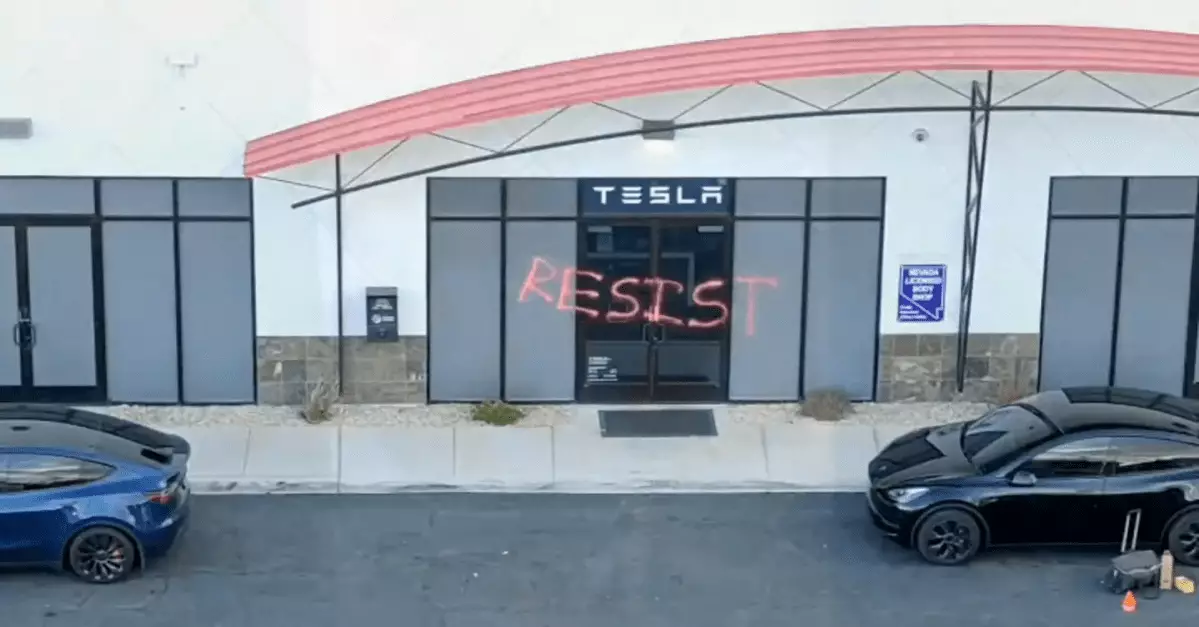Recent incidents targeting Tesla vehicles have escalated into a concerning trend that demands greater scrutiny. The stark reality of these attacks, particularly the arson incidents in Las Vegas and Kansas City, suggests that underlying social and technological tensions are coming to a boil. These acts of vandalism are not merely isolated incidents but represent a growing dichotomy between traditional automotive views and the emergent electric vehicle (EV) culture. Such attacks prompt a revolutionary shift in how we view these crimes – with lawmakers even considering classifying them as domestic terrorism.
Incidents and Investigations
The Las Vegas incident, involving a suspect clad in black launching Molotov cocktails at Tesla vehicles, presents a chilling snapshot of rising hostility. The audacity to inscribe the word “resist” onto the vehicles signifies a broader opposition against technological progress. Deputy Fire Chief Jennifer Wyatt’s remarks highlight the critical danger posed to the community; the flames from a Tesla battery can lead to catastrophic outcomes, as numerous experts have outlined. Meanwhile, the FBI’s joint terrorism task force’s involvement crucially underscores the severity of the situation. This is no longer just vandalism; it’s a wake-up call for those using such means to express dissent.
The Kansas City episode further exacerbates the issue. An officer’s inability to extinguish a fire on a Cybertruck demonstrates a profound concern for public safety when the technology hasn’t fully integrated into our infrastructural norms. With the two Cybertrucks catching fire in a supposed safe space, we are left to ponder the implications for the electric vehicle industry. Could this deterioration of trust signal a broader societal backlash against innovation?
Elon Musk’s Response and Public Sentiment
Tesla CEO Elon Musk’s labeling of these events as “terrorism” only fuels the narrative that there is a concerted effort to undermine the growth of electric vehicles. Musk, as a polarizing figure, invariably attracts both fervent supporters and staunch opponents. However, his remarks hit a nerve, highlighting that Tesla’s mission — to produce environmentally-friendly vehicles — is under attack. By framing this situation in the context of terrorism, it forces us to reconsider how society’s disdain for certain innovations can manifest into violent actions.
This complex landscape requires an urgent discussion around public perception of electric vehicles. The drastic reaction from some individuals may stem from a deep-seated fear of change, particularly in an industry traditionally dominated by gasoline-powered vehicles. Positioning these attacks as acts of domestic terrorism can polarize public opinion but may also initiate necessary dialogues regarding acceptance and adaptation to technological evolution.
The Underlying Issues at Play
The hostility evident in these attacks indicates not only personal animosity towards Tesla but also reflects broader societal concerns regarding the implications of rapid technological change. It begs the question – are we ready for the EV revolution? As these incidents unfold, it reveals a fissure between those who advocate for sustainable practices and those who resist change due to various fears ranging from economic displacement to cultural shifts.
The dichotomy between innovation and the perceived threat it poses will likely persist, but it is essential for society to navigate this transition with informed discussions and clear communication regarding the benefits and challenges of electric mobility. As we venture deeper into an electric era, it’s clear that both the conditions for growth and the resistance to it will shape the landscape of the future.

